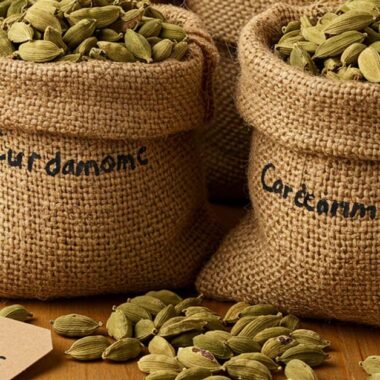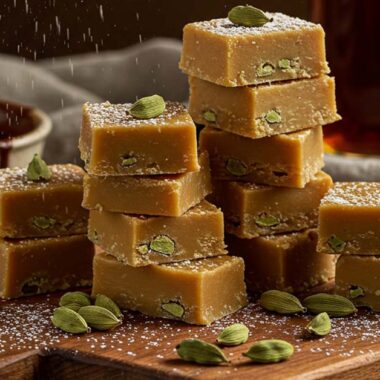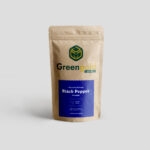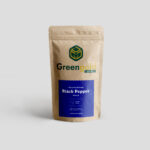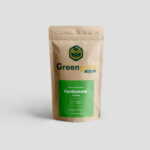Cardamom, often called the “Queen of Spices,” is widely appreciated for its culinary, medicinal, and aromatic properties. However, what many may not know is that cardamom also holds a significant place in various religious rituals and spiritual practices. From ancient traditions to modern-day ceremonies, cardamom has been used in religious offerings, incense, and sacred drinks, symbolizing purity, divine blessings, and the connection between the material and spiritual worlds.
In this blog, we will explore cardamom’s profound role in religious rituals across different cultures and faiths.
1. Cardamom in Hinduism: Symbol of Purity and Prosperity 🕉️
In Hinduism, cardamom is considered a sacred and auspicious spice, often used in religious rituals and ceremonies. Its sweet and spicy fragrance is thought to invite the presence of the divine and purify the surroundings.
Uses in Hindu Rituals:
- Offerings to Deities: Cardamom is commonly included in offerings to deities during prayers and festivals. It is believed that the fragrance of cardamom helps in attracting divine blessings and good fortune. It is often placed on altars or included in prasad (religious offerings) during poojas (prayers).
- Aromatic Incense: Ground cardamom is sometimes mixed with other herbs and spices to make incense. When burned, the aroma is believed to purify the air, create a serene environment, and uplift the spirit during worship.
- Festivals: During significant Hindu festivals like Diwali (Festival of Lights) and Navratri, cardamom is often added to sweets and other offerings, symbolizing abundance and prosperity.
2. Cardamom in Islamic Traditions: A Symbol of Purity ☪️
In Islam, cardamom is not only a spice valued for its culinary uses but also has a symbolic connection to purity and spirituality. The Prophet Muhammad (PBUH) is reported to have recommended various herbs and spices, including cardamom, for its health benefits. Its role in religious rituals is closely tied to cleanliness, well-being, and enhancing prayer and worship.
Uses in Islamic Rituals:
- Traditional Teas: Cardamom is a key ingredient in Arabic coffee (Qahwa) and Chai, both of which are often consumed during social gatherings and after prayers. Drinking these spiced beverages is considered a way to promote well-being and unity.
- Sweets and Offerings: During religious holidays, like Eid, cardamom is used in the preparation of sweets such as baklava and ma’amoul. These treats are shared with loved ones as a gesture of generosity and gratitude, aligning with the spiritual teachings of charity.
- Perfumed Oils: In some Islamic traditions, cardamom is used in creating attar (natural perfumes). Its fragrance is considered to cleanse and purify the spirit, often worn during prayers or special occasions.
3. Cardamom in Buddhist Practices: Enhancing Mindfulness and Meditation 🧘♂️
In Buddhism, cardamom’s use extends beyond the physical world and into the spiritual realm. The spice is believed to help enhance mindfulness and focus, which are essential qualities for meditation and spiritual growth.
Uses in Buddhist Rituals:
- Aromatic Offerings: In Buddhist temples, cardamom may be used in incense blends to create a calm and serene atmosphere conducive to meditation. The fragrance helps practitioners center their minds and remain present in their practice.
- Sacred Tea: In some Buddhist cultures, cardamom is added to herbal teas or cha (tea), which are consumed during meditation sessions or as part of offerings to the Buddha. The tea serves as both a physical and spiritual nourishment, promoting mindfulness.
4. Cardamom in Christian Traditions: A Symbol of Healing and Blessings ✝️
Though cardamom is not as prominently featured in Christian religious rituals as in some other faiths, it still holds a place in symbolic acts, particularly within the context of healing and spiritual nourishment.
Uses in Christian Rituals:
- Healing Incense: In some Christian healing rituals, cardamom is used as part of an aromatic incense blend meant to aid in spiritual healing. Its calming fragrance is thought to purify the soul and create an atmosphere conducive to prayer.
- Sacred Oils and Anointing: In certain Christian traditions, cardamom is used in the preparation of anointing oils, which are used to bless individuals during significant life events such as baptisms or healing services.
- Christmas Traditions: Cardamom is often used in baking and cooking during Christmas, where it finds its way into traditional treats like gingerbread and spiced cookies. This connects cardamom to the symbolic themes of warmth, joy, and the spirit of giving during the holiday season.
5. Cardamom in African Spirituality: Sacred Herb for Blessings and Protection 🌍
In many African cultures, especially in West Africa, cardamom is used in spiritual and healing practices. Its aromatic properties are believed to have protective and purifying effects, making it a vital ingredient in rituals for spiritual cleansing and blessings.
Uses in African Rituals:
- Sacred Smudging: Cardamom, along with other herbs like sage and frankincense, is used in smudging rituals to cleanse spaces and individuals. The smoke from burning cardamom-infused herbs is believed to ward off negative energy and bring about spiritual protection.
- Healing Teas and Infusions: Cardamom is also added to herbal teas, which are consumed during healing ceremonies or to promote mental clarity and physical well-being. These teas are shared as part of rituals aimed at restoring balance to the body and spirit.
Conclusion: Cardamom’s Spiritual Connection Across Cultures 🌍✨
Cardamom’s role in religious rituals transcends cultures, faiths, and regions. Whether it is used in Hindu poojas, Islamic teas, Buddhist meditation, or African smudging rituals, this aromatic spice has deep spiritual significance. Its association with purity, protection, and spiritual nourishment makes it a powerful element in connecting the physical and spiritual realms.
By incorporating cardamom into religious rituals, practitioners not only benefit from its flavor and aroma but also from its deeper symbolism. It serves as a reminder that even the simplest natural elements can hold profound spiritual significance, offering blessings, healing, and connection to the divine.
Incorporating cardamom into your daily life—whether for culinary, medicinal, or spiritual purposes—can help you connect more deeply with ancient traditions, enhance your rituals, and create a sense of inner peace and balance. 🌿🙏

